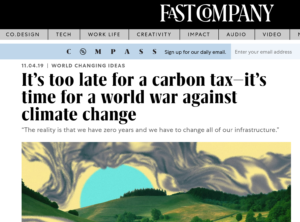The world’s carbon budget—the amount of greenhouse gas emissions that humans can still pump into the atmosphere before we no longer have a chance of keeping global warming at 1.5 degrees Celsius—is almost used up.
In a landmark report last year, the UN’s climate body, the IPCC, said that we need to essentially halve emissions by 2030 to have a 50% chance of staying under 1.5 degrees. That deadline is now only about 10 years away. But the actual situation is even more urgent because of the problem of “committed emissions,” all of the cars and power plants and furnaces and other things that already exist now and have years or decades left of use.
“The very concerning reality is that these things that exist today are already going to emit all of the carbon we have [left in the budget] in that 10- or 11-year period, by virtue of the fact that there’s already a billion cars in the world with internal combustion engines and people aren’t going to stop driving tomorrow,” says Saul Griffith, an inventor and serial entrepreneur who is advising current presidential candidates on climate policy and who recently spoke about the need to go beyond the Green New Deal at Verge, a conference focused on the clean economy. “They’re going to emit a lot. And the existing coal plants and existing natural gas plants will emit a lot. The consequence of that is this 10-year headline gives us a false sense of security. The reality is that we have zero years and we have to change all of our infrastructure.”

That means that it’s too late, he says, to rely on something like a carbon tax to incentivize a gradual shift to lower-carbon products. “If you’ve got a carbon tax and you slowly raise the carbon tax, then it slowly modifies our behavior, but to hit the climate target that the children want and the scientists want, it simply is not a fast enough acting mechanism,” he says.
There also isn’t time to wait for the usual rates of market adoption for new technology. “Because of committed emissions, we can’t wait for natural adoption curves, like if 2% of people buy a Tesla next year and 4% the year after that,” Griffith says. “At this point, basically, to hit any reasonable climate target, you need 100% adoption at everyone’s next purchase.”
He says that companies shouldn’t just be thinking about how to be more efficient, but how to completely substitute zero-carbon technologies for current practices; entire industries should commit to transformation. In the U.S., Griffith argues that we need to go even further than a Green New Deal, deploying an Apollo project-scale transformation of the agriculture industry to move to practices that sequester carbon and a Manhattan Project-like research effort to create a “material economy that absorbs carbon rather than emits it.” He suggests the idea of a “World War Zero” against climate change that has as much urgency as the last World War.



